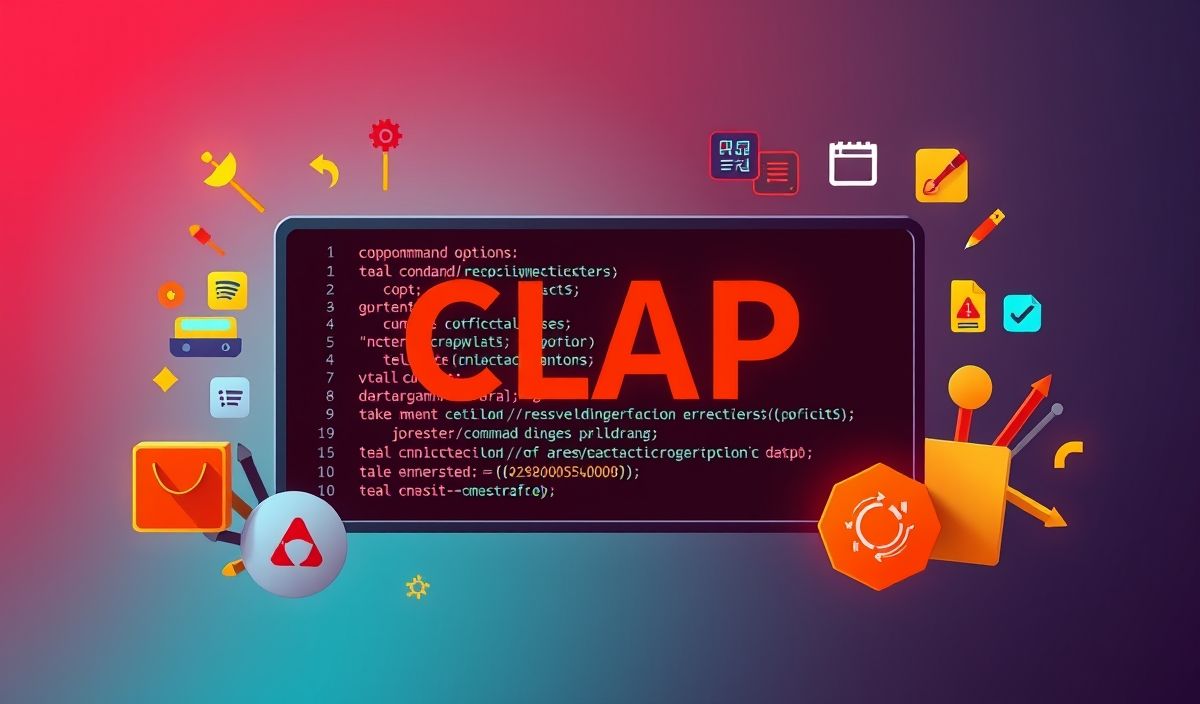Introduction to Clap in Rust
Clap is a powerful command-line argument parsing library in Rust that makes it easy to build robust command-line interfaces. With Clap, you can define complex command-line options, subcommands, and automated help and version generation.
Getting Started with Clap
First, add Clap to your dependencies in Cargo.toml:
[dependencies] clap = "3.0"Then, you can start using it in your project:
use clap::{Arg, App};
fn main() {
let matches = App::new("MyApp")
.version("1.0")
.author("Your Name ")
.about("Describes what the application does")
.arg(Arg::new("INPUT")
.about("The input file to use")
.required(true)
.index(1))
.arg(Arg::new("debug")
.short('d')
.long("debug")
.about("Activate debug mode"))
.get_matches();
// You can get the value of the input file as follows:
if let Some(input) = matches.value_of("INPUT") {
println!("Using input file: {}", input);
}
if matches.is_present("debug") {
println!("Debug mode is on");
}
} Advanced Uses of Clap
Clap supports many advanced features like subcommands, default values, and custom validators. Here are some more examples:
Subcommands
use clap::{App, SubCommand};
fn main() {
let matches = App::new("MyApp")
.subcommand(SubCommand::with_name("test")
.about("does testing things")
.version("1.3")
.author("Someone Else ")
.arg_from_usage("-d, --debug 'Print debug information'"))
.get_matches();
if let Some(matches) = matches.subcommand_matches("test") {
if matches.is_present("debug") {
println!("Debugging is enabled");
}
}
} Default Values
use clap::{Arg, App};
fn main() {
let matches = App::new("MyApp")
.arg(Arg::new("config")
.short('c')
.long("config")
.about("Sets a custom config file")
.default_value("default.conf"))
.get_matches();
println!("Value for config: {}", matches.value_of("config").unwrap());
}Custom Validators
use clap::{Arg, App};
fn main() {
let matches = App::new("MyApp")
.arg(Arg::new("number")
.short('n')
.about("A number between 1 and 10")
.validator(|v| {
v.parse::()
.map_err(|_| String::from("Must be a number"))
.and_then(|n| {
if n >= 1 && n <= 10 {
Ok(())
} else {
Err(String::from("Must be between 1 and 10"))
}
})
})
.required(true))
.get_matches();
println!("Value for number: {}", matches.value_of("number").unwrap());
} Full Application Example
Here is a complete example that combines various features of Clap for a more comprehensive application:
use clap::{Arg, App, SubCommand};
fn main() {
let matches = App::new("CliApp")
.version("1.0")
.author("Your Name ")
.about("An example of using Clap with subcommands, arguments, and flags")
.arg(Arg::new("config")
.short('c')
.long("config")
.about("Sets a custom config file")
.default_value("default.conf"))
.subcommand(SubCommand::with_name("test")
.about("does testing things")
.version("1.3")
.author("Someone Else ")
.arg(Arg::new("debug").short('d').long("debug").about("Print debug information")))
.subcommand(SubCommand::with_name("process")
.about("process inputs")
.arg(Arg::new("INPUT").required(true).index(1).about("Input file to process")))
.get_matches();
if let Some(c) = matches.value_of("config") {
println!("Value for config: {}", c);
}
match matches.subcommand() {
("test", Some(test_matches)) => {
if test_matches.is_present("debug") {
println!("Running in debug mode");
} else {
println!("Running in normal mode");
}
}
("process", Some(process_matches)) => {
if let Some(input) = process_matches.value_of("INPUT") {
println!("Processing input file: {}", input);
}
}
_ => println!("No valid subcommand provided"),
}
} With these examples, you should have a solid foundation for using Clap in your Rust applications. Happy coding!




